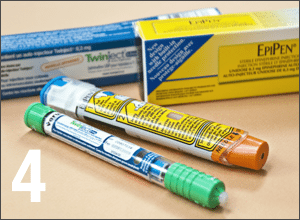While Miley Cyrus, Lady Gaga and other celebs embrace the gluten-free diet for weight loss, the truth is: for most people who adopt the diet for celiac disease, the results are quite the opposite.
In a 2006 study published in the American Journal of Gastroenterology, a whopping 81 percent of celiacs on the gluten-free diet gained weight within two years after diagnosis. A key issue is that a person with celiac disease wasn’t able to properly absorb nutrients before diagnosis. But once on a gluten-free diet, the gut heals, and that’s when the now-diagnosed individual finally starts absorbing protein, calories and fat.
The result: those with celiac disease who eat the exact same amount of calories, protein and fat as they always did can suddenly begin to gain weight.
Allergic Living offers 5 great tips to keep off the extra pounds while living a healthy gluten-free lifestyle.
1. Become label literate
Be mindful of the serving sizes on packaged gluten-free products. They are often smaller than their gluten-containing counterparts – meaning that, for example, if you used to eat three-quarters of a cup of regular cold cereal for breakfast, you might need to reduce that to two-thirds of a cup of gluten-free cereal.
2. Stave off hunger with veggies and lean protein
“A common complaint from those on gluten-free diets is ‘I’m always hungry,’” says registered dietitian Alexandra Anca. Solution: drink more fluids and eat more lean protein, fruits and vegetables. Anca recommends gluten-free whole grains like quinoa or buckwheat: “They fill you up more and better – and they take a long time to digest.” Also boost your intake of chickpeas, beans and lentils.
3. Recognize that it’s partly psychological
When you’re gluten-free, it’s common to become obsessed with having satisfying starchy food, like bread, pasta and cookies. That’s because you suddenly can’t have what you’ve had – and loved – your whole life. Being aware of cravings and why they’re occurring is the first step to managing them.
4. Seek support
Find an in-person or online support group – especially if you cannot find a registered dietitian in your area who specializes in celiac disease. “Finding support should be your Number 1 priority,” says a Pennsylvania mother who struggled with post-celiac diagnosis weight gain. “With support you find resources, and you don’t feel so alone. You find people who will say, ‘I had the same problem, and this is what worked for me.’”
5. Get moving!
Put simply, losing weight requires expending more energy than you consume. On top of living a moderately active lifestyle (taking the stairs, walking), try to add 30 minutes of vigorous activity to your day at least a few days per week. (Speak to your doctor before starting any new exercise regimen.)
Related Reading: Gluten-Free Diet and Your Weight





